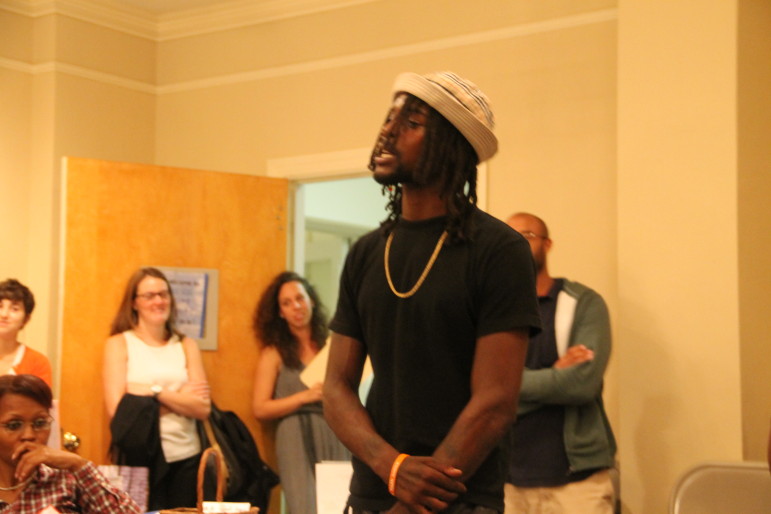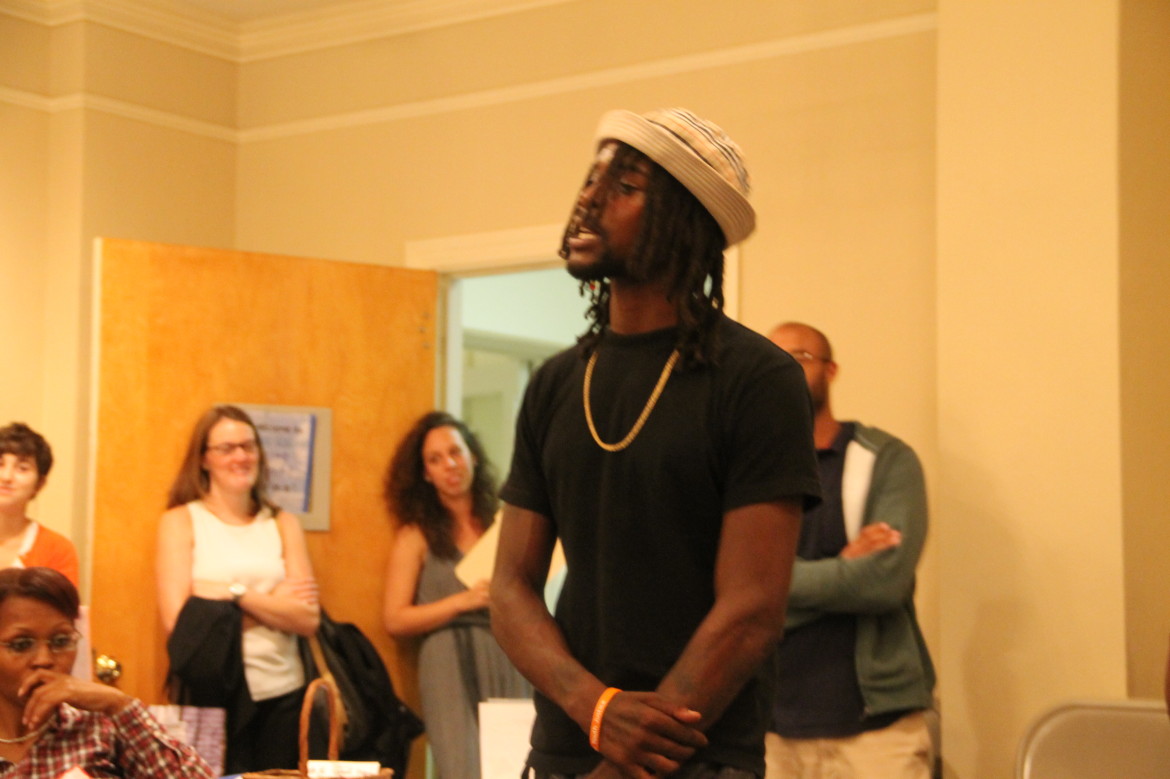
Gary Gately / JJIE
Free Minds member Michael Kemp speaks at a monthly “Write Night” session in Washington. Kemp, who spent five years incarcerated for possession of a firearm, now serves as a “poet ambassador,” connecting D.C. audiences with Free Minds poets, and as a spokesman for the Campaign for Youth Justice, which strives to end the practice of trying and sentencing youths in the adult criminal justice system.
WASHINGTON – The eight teenagers clad in orange jumpsuits sit in a circle inside the chapel at the D.C. jail.
They’ve all been charged with or convicted of felonies, but they’re here on this Thursday afternoon not to talk crime or life on the streets, but to read and discuss a book and a poem, then write poetry.
For the inmates, all juveniles charged as adults, the weekly reading group of the Free Minds Book Club & Writing Workshop provides a respite from the doldrums of life on the inside.
But more than that, Free Minds members say, the club transforms lives.
Like many of the books read during the weekly jail session, tonight’s selection focuses on topics close to the teens’ lives: “Two the Hard Way” by Travis Hunter tells the story of two brothers who live in a dangerous Atlanta housing project, and one of them is released from prison after serving two years for a crime he did not commit.
As the session begins, Tara Libert, the co-founder and executive director of Free Minds, leads the teens in meditation:
“We just want to get rid of all the stress of the outside world so we can open our minds, relax and really focus on your creativity, so today we’ll just put our feet on the ground – ah – breathe deeply, close our eyes … and just take yourself, progressively relax all your muscles and breathe really deeply and focus on breathing in with the good – hope, joy, love – and breathe out any kind of stress. If you’re worried about your case, breathe all of that out and just for this moment, you are completely free.”
For a minute, the chapel goes silent.
“OK, and slowly bring yourself out,” Libert says. “How beautiful was that? How often do you guys get total silence?”
The teenage boys take turns explaining what Free Minds means to them.
“Your body’s not free, but your mind is,” one of the inmates says.
“Books empower our minds,” another says.
The weekly sessions are at the D.C. jail, where youths sentenced as adults are housed until they turn 18, but Free Minds’ work does not end there.
When the youths are transferred to federal prisons around the country as adults, they remain members of Free Minds, and the club continues sending them books, along with a monthly newsletter featuring essays and poems by fellow members.
After their release, former inmates are still considered members of the club and Free Minds offers them internships and help with resumes and job-seeking skills.
Every Tuesday, a Free Minds representative meets individually with each teen to check in on him. This may mean finding out why one of them is sitting alone and seems angry or offering to write a letter to a judge on behalf of another inmate facing sentencing.
And at monthly “Write Nights,” volunteers from the community – in the past they’ve included college students, lawyers, heads of corporations and public defenders, among others – offer written feedback on inmates’ poems. The poems are then typed, printed and returned to the Free Minds members on the inside with the feedback. “Poet ambassadors,” Free Minds members who have been released from prison, also read poems from inmates at the monthly sessions.
At the recent jail session, the inmates read from and discuss “Two the Hard Way” before turning their attention to reading and writing poetry.
The poem they read, “Mommy,” was written by a Free Minds member and former inmate who served seven years, two of them in solitary confinement, and it focuses on his mother, who was addicted to drugs.
“The most beautiful flower on God’s green earth, yet at the same time, the most wretched weed,” the poem reads.
It calls the mother “strong for being able to raise a boy to a man all on your own, yet weak for falling victim to temptation.”
The young inmates ponder the poem.
What does the poem’s author compare his mother to when she’s on drugs? Libert asks. When she’s not on drugs?
The boys then try their hand at writing their own poems. Tonight’s topic: addiction.
One writes of his own addiction to K2, a form of synthetic marijuana, saying, “This is about me. K2, K2, it’s what I love to do…”
Another writes of “Squirrel,” an addict he knew: “I am disgusted. He probably could have been an engineer. Instead, I think he’s going to overdose.”
Another inmate writes of “Aunt Missy,” an addict:
“She wears nice clothes, designer, but she stinks. She’s gone, way gone in her addiction, like, it’s far. I can tell because she’ll do anything for it, anything¸ everything. Rob, steal, use the blade she always has with her. I think it’s her fault. I look down on her because you can control that, I think.”
Other inmates gathered in the chapel, where three big, wooden crosses stand, clap.
Free Minds has brought books and a whole lot more into the lives of some 700 juvenile inmates since the non-profit started in 2002.
The book club wouldn’t exist but for four years’ of correspondence about books between co-founder and book club coordinator Kelli Taylor and Glen McGinnis, who was convicted of murder and executed in Texas in 2000.
In 1996, Taylor, then a producer in the Washington bureau of the Australian Broadcasting Corp., received an unsolicited letter from McGinnis about the number of blacks and Latinos on death row. Taylor went on to produce a documentary about McGinnis and others on death row in America for crimes they committed as juveniles.
Taylor and McGinnis, who was convicted of shooting a dry cleaner service clerk during a robbery, developed a friendship and began corresponding about books she read and sent to him to read.
Today, Taylor and Libert refer to McGinnis as “the first Free Minds member.”
Taylor says she saw his dramatic personal and educational growth through his letters as they corresponded about everything from “Harry Potter” to books by Toni Morrison and John Grisham.
“If he had been the person he was when he died back when he was 17, [the murder] wouldn’t have happened,” she said.
She also got to know parts of McGinnis’ story. He was raised by a crack-addicted mother who physically abused him, was sexually abused by his stepfather and physically abused by other men his mother brought home. His formal education ended at age 11 and he sometimes lived on the streets when he wasn’t incarcerated as a juvenile for theft and trespassing.
On the night of the robbery and murder, McGinnis had told his mother he would get money for her after she said she desperately needed it.
Taylor says she witnessed the power of books and reading, and McGinnis did too.
“When he did become educated, he saw the world in such a different way,” she said. “He saw what he could have become and how his life could have been, whereas when he was 12, 13 and enduring all this abuse, he couldn’t see any way out.”
After corresponding with McGinnis, Taylor volunteered as a mentor in the Arlington (Va.) County jail, while Libert, a fellow news producer whom Taylor knew, was volunteering in a family literacy program in the D.C. jail.
In retrospect, Taylor says meeting and corresponding with McGinnis led to her work with Free Minds.
“It wasn’t something that I set out to do, for sure,” she said. “I just believe it was like a calling, what I was meant to do, because it just so came out of the blue. It wasn’t something I pursued or anything.”
Taylor and Libert say it’s their belief in the potential of the young inmates that sustains them as they juggle the jail sessions, the monthly Write Nights, sending books and corresponding with 200 Free Minds members in 46 prisons in 23 states, and re-entry efforts for members who have been released from prison.
Typically, the Free Minds members have been convicted of crimes involving a weapon or violence, including armed robbery, carjacking, manslaughter and homicide.
Libert knows some people write off the juvenile offenders.
“People say it’s too late, and our message is it’s never too late and with the right support, they can turn their lives around and contribute to society,” she said. “The challenge for us as a community is to provide that right support.
“They’re unbelievably resilient and they have hope so we’ve got to have hope. ...First, it’s a challenge to help them open their eyes to another world, so it’s like, ‘Can I find that right book that’s going to engage them because the books are really another way of living?”
Libert said of the payoff: “I love seeing when the light bulb goes on and the kid reads his first book and has a passport to the world, you know, the world is opened up to him.”
Free Minds members help select the book via “book ballot.” Among their choices: the “Harry Potter” books, “Pay It Forward” by Catherine Ryan Hyde; “Makes Me Wanna Holler” by black former Washington Post reporter Nathan McCall, who recalls his childhood and rehabilitation in prison; “A Question of Freedom” by R. Dwayne Betts, a black author who writes of a carjacking he participated in and his nine years in prison in which he discovered the transformative power of books; and “The Freedom Writers Diary,” in which a teacher inspires Long Beach, Calif., high school students to keep diaries of the violence, homelessness, racism and abuse that surrounded them.
Free Minds members say immersing them in books – and following up with them through their incarceration in prison and after their release – has a huge impact in their lives.
And Libert says that’s reflected in the recidivism rate for members: It’s 26 percent – with half of those for parole violations, and only 1 percent for violent crimes – within one year of release. Elsewhere, recidivism rates for those imprisoned as juveniles range from about 70 percent to about 90 percent, Libert says.
For Michael Kemp, Free Minds made all the difference.
Kemp, 23, was jailed in D.C. in 2007 for possession of a firearm. He says he attended his first Free Minds session to get him off his cellblock for a while.
But then he found he got into the books, the discussions, the poetry writing – and he kept coming back to the sessions.
When he was shipped out to federal prisons in Tennessee, Arkansas, Pennsylvania and Ohio during his five years of incarceration, Free Minds stayed in touch, sending books, its monthly newsletter and birthday cards.
“It was like, damn, man, they’re really sticking with me,” Kemp said.
Now, he serves as the lead “poet ambassador” for Free Minds, connecting D.C. audiences with Free Minds poets, and serves as a spokesman for the Campaign for Youth Justice, which strives to end the practice of trying and sentencing youths in the adult criminal justice system.
Speaking of Free Minds, Kemp said: “It was one of the best things to happen for me, you know, once I got the opportunity to help change my life for real. It really opened my mind up [and] not to care what anybody said to hold me back.”
